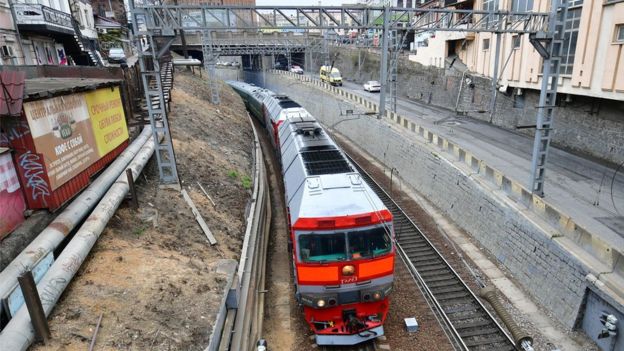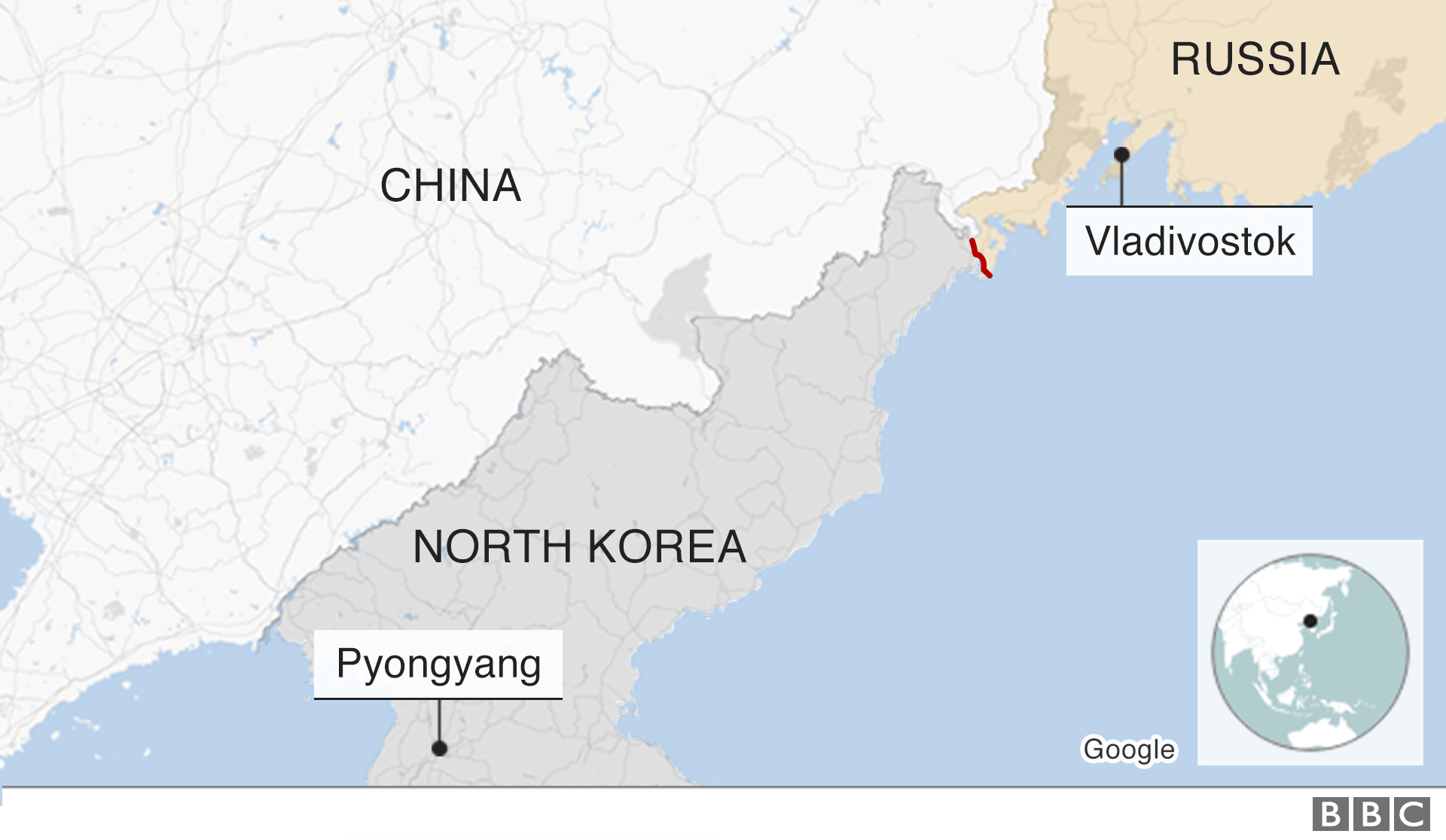
This article is more than
6 year oldMr Kim arrived by train in the Pacific Coast city of Vladivostok for his first talks with the Russian president, which are expected to start on Thursday.
He was welcomed by officials with a traditional offering of bread and salt.
Russia says they will discuss the Korean peninsula's "nuclear problem" but Mr Kim is also said to be seeking support after talks with the US failed.
US President Donald Trump and Mr Kim met in Hanoi earlier this year to discuss North Korea's nuclear weapons programme but the summit - their second - ended without agreement.
The North Korean leader greeted Russian officials warmly on his arrival in Vladivostok.
After tasting traditional korovai bread and salt, Mr Kim was entertained by a brass band before he got inside a car flanked by bodyguards who - in now familiar scenes - jogged alongside the vehicle as it departed.
"I arrived in Russia bearing the warm feelings of our people, and as I already said, I hope this visit will be successful and useful," Mr Kim told Russian TV earlier, after crossing the border at Khasan.
"I hope that during the talks with respected President Putin, I will be able to discuss in a concrete manner issues relating to the settlement of the situation on the Korean peninsula, and to the development of our bilateral relations."
It is due to take place on Thursday afternoon at about 13:00 (03:00 GMT) on Russky island, just off Vladivostok, Russian presidential spokesman Dmitry Peskov was quoted as saying by Russia's Interfax news agency.
Russian and North Korean national flags are already in place on the island, where the leaders are expected to meet on a university campus.

Mr Putin was expected to arrive for the summit later.
According to his spokesman, the Kremlin believes the six-party talks on North Korea, which are currently stalled, are the only efficient way of addressing the issue of nuclear weapons on the Korean peninsula.
Those talks, which began in 2003, involve the two Koreas as well as China, Japan, Russia and the US.
"There are no other efficient international mechanisms at the moment," Mr Peskov told reporters.
"But, on the other hand, efforts are being made by other countries. Here all efforts merit support as long as they really aim at de-nuclearisation and resolving the problem of the two Koreas."
This visit is being widely viewed as an opportunity for North Korea to show it has powerful allies following the breakdown of nuclear talks with the US earlier this year, the BBC's Laura Bicker says.
The country has blamed US Secretary of State Mike Pompeo for the collapse of the Hanoi summit in February.
Earlier this month North Korea demanded that Mr Pompeo be removed from nuclear talks, accusing him of "talking nonsense" and asking for someone "more careful" to replace him.
The summit is also an opportunity for Pyongyang to show that its economic future does not depend solely on the US, our correspondent adds.
Mr Kim may also try to put pressure on Moscow to ease sanctions.
Analysts believe this summit is a chance for Russia to show that it is an important player on the Korean peninsula.
President Putin has been eager to meet the North Korean leader for quite some time. Yet amid the two Trump-Kim summits, the Kremlin has been somewhat sidelined.
Russia, like the US and China, is uncomfortable with North Korea being a nuclear state.

Senior officials say the Kremlin is hoping to see a reduction in tensions on the peninsula.
Mr Putin's foreign policy aide, Yuri Ushakov, said the situation there had "stabilised somewhat" in recent months.
"Russia intends to help in any way possible to cement that positive trend," he told reporters on Tuesday.
A South Korean foreign ministry spokesman said Russia "shares our viewpoints" on denuclearisation and peace on the peninsula.
Nuclear activity seems to be continuing in North Korea, and the country said it had tested a new "tactical guided weapon" - thought to be a short-range missile - earlier in April.
During the Cold War, the Soviet Union (of which Russia is the main successor state) maintained close military and trade links with its communist ally, North Korea, for ideological and strategic reasons.
After the Soviet Union collapsed in 1991, trade links with post-communist Russia shrank and North Korea leaned towards China as its main ally.
Under President Putin, Russia recovered economically and in 2014 he wrote off most of North Korea's Soviet-era debt in a major goodwill gesture.
While it is arguable how much leverage Russia has with the North today, the communist state still regards it as one of the least hostile foreign powers.